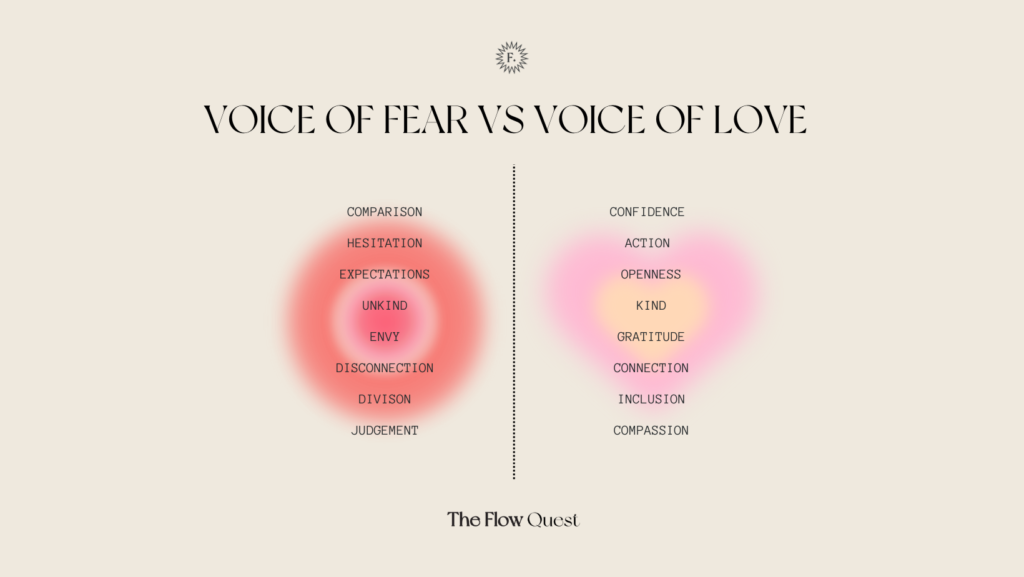Each of us has a voice inside our heads that oftentimes is harsh, unforgiving and downright negative. That voice has a name – fear. Sometimes, it feels easier to listen to fear than to listen to the voice of positivity – love. These two voices define everything we do, what motivates us, the choices we make and the way our personal worlds are coloured.
Fear looks and sounds like insecurity, envy, shame, doubt, bitterness, hate, sadness and frustration. It’s easy for our personal belief systems to be influenced by fear. When fear takes over, we forget who we are and tell ourselves stories that aren’t always true. The thing about stories is, they never truly end, they continue on in our minds. But, at the end of the day, they really are just stories. We choose fear, often subconsciously, from the media we consume, to the conversations we entertain, to our very own thoughts. When we align ourselves with the energy of love, we are no longer blocked by this ever present fear. Love looks and sounds like compassion, happiness, gratitude, hope, kindness, confidence and optimism. Love was your natural state of being when you were born. How beautiful is that? Do you remember the last time you looked at things through a lens of curiosity and wonder?

As we get older, the way we begin to look at the world begins to change. It is easy to start to look at the world around us through a lens of apprehension while being ridden with anxiety. We begin to make fear-based decisions. From big life shifts to small everyday choices, we can fall into listening to fear rather than love. This way of thinking is able to bleed into so many areas of our lives without us even being aware of it. When we were introduced to the fear vs love mindset, it really resonated with us. If you are open to it, we think it might just have the same positive impact on you.
Learning to Overcome Fear-Based Emotions
When we learn how to overcome fear based emotions we are better equipped to move into love-based thinking. This has helped me immensely and continues to this day.
Step 1: Naming Fear
Get a pen and paper and start to write down your fears. Name the fear based emotions you feel. If you are visual, draw them. This will put a lot into perspective for you. At first, it’s easy to think that this is some kind of backwards manifestation practice. You may think to myself “Why would I want to call attention to what I don’t want and what doesn’t feel good”. You will quickly realize that ignoring emotions and fear all together is not the answer. We can’t dismiss fear, instead we need to lean into understanding it. When we understand our feelings and why we may be feeling it, we are then capable of overcoming it. A simple practice for acknowledging your fear, is to say to yourself “it is just a feeling” when a fear based thought pops up. This phrase you can repeat to yourself, reminding you that it is ok that a negative emotion is coming up. What it also does is allow you to actively reframe your own thoughts and lean into love.
Step 2: Trading Fear for Love or Creating Love
We know that we have to confront fear to make space for love. Understanding our emotions is only the beginning of shifting from a fear-based mindset to a love-based mindset. We need to actually personally create positive emotions. In the beginning, this concept can be confusing. How can we create positive emotions? Well, keep that pen and paper out while you are at it. Write down what you are currently grateful for. Also, write down what you will be grateful for in the future – things that have not even happened just yet. There you go, you just created positive emotions by practicing gratitude. Opening your heart to what are you thankful for is pivotal in the process of adopting love based thinking.
Step 3: The Art of Surrendering or Living in the Unknown
If you are anything like us, you struggle with letting go of control and not being able to predict the next moment. Or, you feel like you can predict the next moment and you have trouble letting go of fear-based narratives. The thing is, if you are looking for something negative, you will find it. You will continue to find it and surrender to other feelings aligned with a fear-based state. Sometimes fear is what has become familiar to us so we opt for choosing it. We wake up in the morning and the first thing we think of is what could go wrong, everything we are dreading doing, and reflect on experiences attached to emotions – many of them fear-based. But, Imagine with me for a moment, you wake up in the morning, you chose to let go of all of it: fear from past, present and future. You just do one thing: let go and by doing that you surrender to love. Surrendering to love means being ok with the unknown and at first that might sound scary. But, we promise you it’s actually very freeing.
Past experiences and feelings tainted with fear do not have to affect your future. Love can be the colour you pick up and use in the masterpiece that is your life. Your energy will be felt far and wide from all around you. Each day brings a new opportunity to lean into love instead of moving towards fear. So, we leave you with this: What would happen if you listened to love instead of fear? What would happen if your love was so loud that it could drown out fear? What would happen if you chose love? What if you created it on your very own?
Affirmations for Adopting A Love Based Mindset
- I am excited to wake up on this new day and I will experience this day with an open heart and mind
- I am filled with love, gratitude and kindness
- Today, I choose to think positively and I create the life of my dreams
- I am not defined by my thoughts and emotions
- I bring in love and let go of fear
Sources & Suggested Resources
- The Four Agreements for a Better Life By Don Miguel Ruiz
- Super Attractor By Gabrielle Bernstein
- Mind-Body-Green Podcast Episode: How to change your life from the inside out ft. Joe Dispenza

































